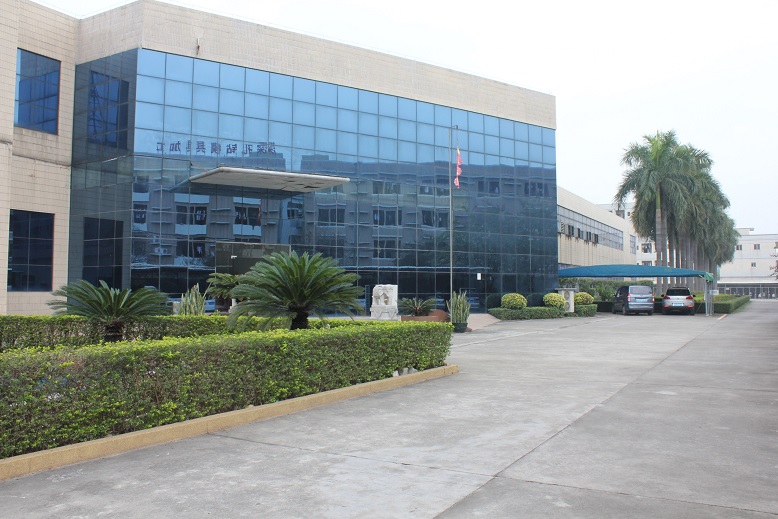

晉東是一家擁有40年經驗的 OEM/ODM 塑膠產品代工製造商
我們通過了主流的質量體系及管理認證,以滿足全球客戶的要求
我們的專業團隊為全球客戶提供 " 一站式服務方案 ", 令客戶安枕無憂
我們的願景是成為全球領先的塑膠玩具製造商,以我們的創新、及對安全和可持續性的承諾,為兒童提供促進學習和樂趣的玩具.
我們的使命是製造高質量及安全的塑膠玩具和製品,致力於啟發兒童的創造力和想像力,同時堅持道德和可持續的發展.
質量第一
價錢合理
全程投入
優質客服
創意創新
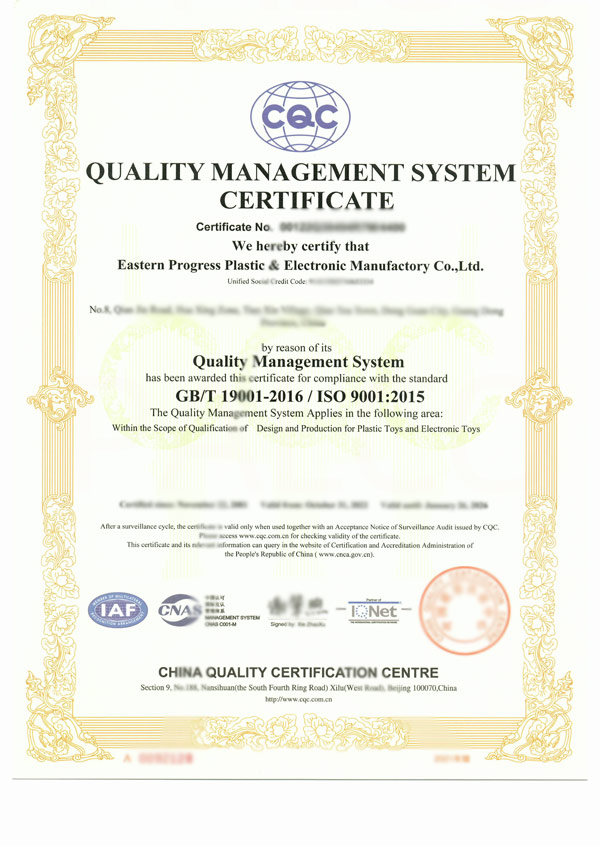
Quality management system
ISO 9001:2015 is a standard for quality management systems (QMS). It was developed by the International Organization for Standardization (ISO), a non-governmental organization that develops and publishes international standards. an organization must develop and implement a QMS that meets the requirements of the standard and undergo an audit by a third-party certification body.
Certification to ISO 9001:2015 demonstrates to customers and other stakeholders that an organization has a well-managed, high-quality QMS in place.
In the context of toy manufacturing, an organization that follows ISO 9001:2015 would have a QMS in place that covers all aspects of the toy manufacturing process, including design, development, production, installation, and servicing. The QMS would include processes for identifying and addressing customer requirements, as well as for controlling and improving the quality of products and services
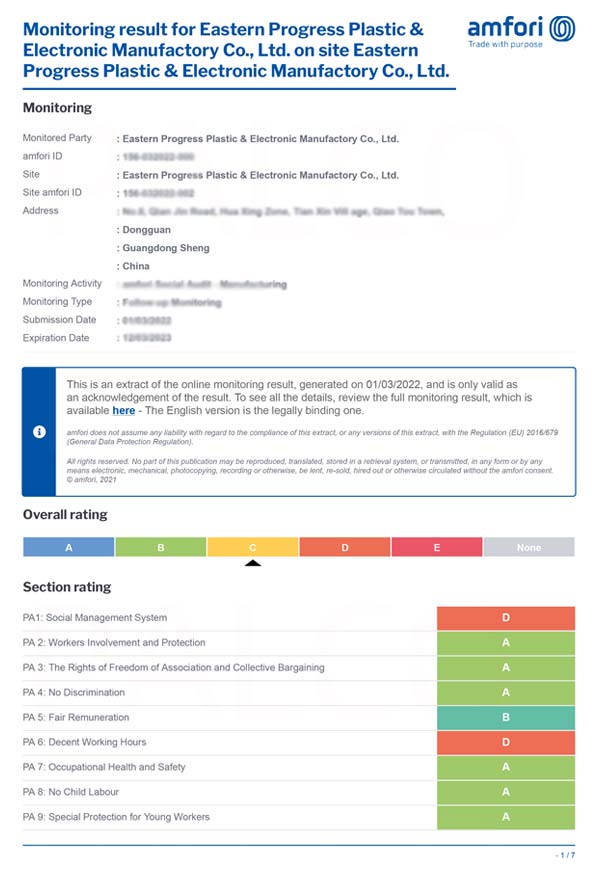
( BSCI ) The Business Social Compliance Initiative
BSCI (Business for Social Compliance Initiative) is a voluntary certification scheme that helps retail and trade businesses improve working conditions in their supply chains.
The scheme was developed in 2003 by the European business organization Foreign Trade Association (FTA). The BSCI Code of Conduct sets out guidelines for fair labor practices, health and safety, the environment and other areas.
BSCI-certified companies are required to implement the code of conduct in their supply chains and undergo regular audits to ensure compliance. The certification is recognized by major retailers and brands as a way to demonstrate commitment to ethical sourcing practices.
The advantages and role of BSCI certification?
1、Fulfilling the requirements of the guests.
2, a certification to cope with different guests - to reduce the number of times different buyers come at different times for factory inspection.
3、Improve the brand image and industry status of the factory.
4、The implementation of the standard can reduce the safety hazards of the factory.
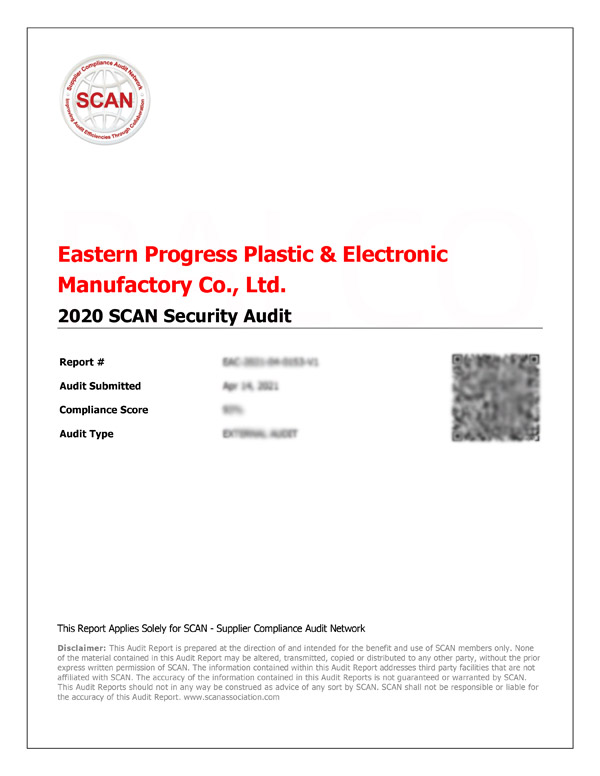
SCAN Security Audit
Eastern Progress Plastic & Electronic Manufactory Co.,Ltd. passed the U.S.A SCAN certificate (Supplier Compliance Audit Network), the inspections include many safe parts, like people, equipment, and process, which is recognized by many well-known enterprises in the U.S.A.
With the SCAN certificate, we can make more American enterprises know about us.
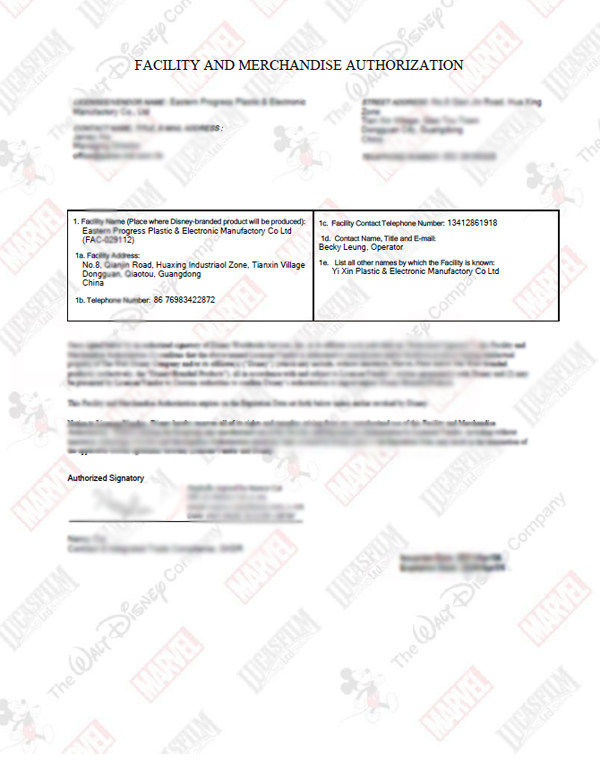
Facility and Merchandise Authorization (FAMA) is a program administered by the United States Customs and Border Protection (CBP) that allows certain importers and exporters to apply for and receive authorization to use designated facilities for the storage, examination, and/or manipulation of imported and exported merchandise. The purpose of the FAMA program is to expedite the import and export process by allowing approved importers and exporters to use these designated facilities to streamline their customs clearance procedures.
To be eligible for the FAMA program, importers and exporters must meet certain requirements, such as having a history of compliance with customs regulations, maintaining an acceptable level of security at their facilities, and demonstrating the ability to handle and store merchandise in a secure and efficient manner. Once approved for the FAMA program, importers and exporters can use designated FAMA facilities to store, examine, and manipulate their imported and exported merchandise, which can help them to reduce costs and improve supply chain efficiency.
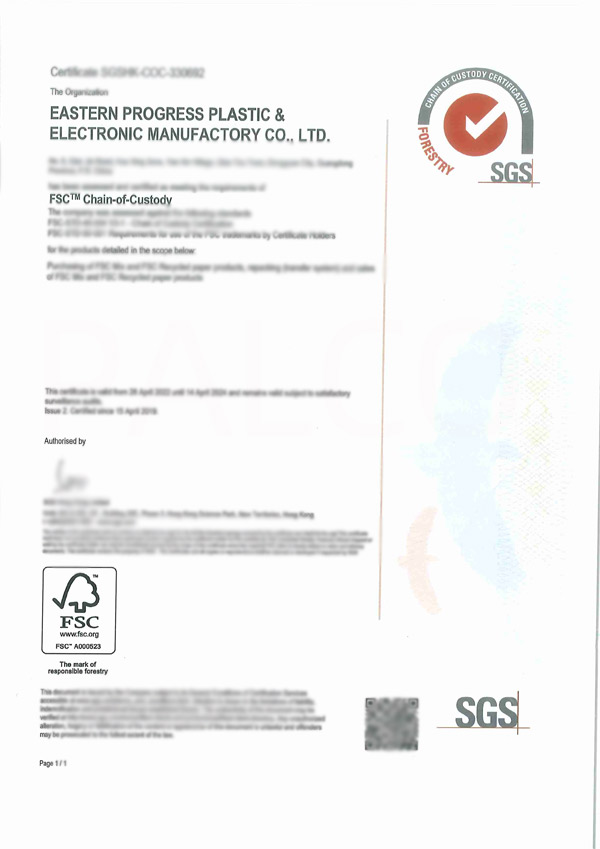
The Forest Stewardship Council (FSC) is an international non-profit organization that promotes responsible management of the world's forests. FSC works to ensure that forests are managed in an environmentally responsible, socially beneficial, and economically viable way. One way that FSC promotes responsible forestry is through its certification program.
FSC certification is a voluntary process that verifies that a company's forestry practices meet FSC's standards for responsible forestry. These standards cover a wide range of environmental, social, and economic aspects of forestry, including protecting forests and their biodiversity, respecting the rights of indigenous peoples, and ensuring that forestry operations are carried out in a sustainable manner.
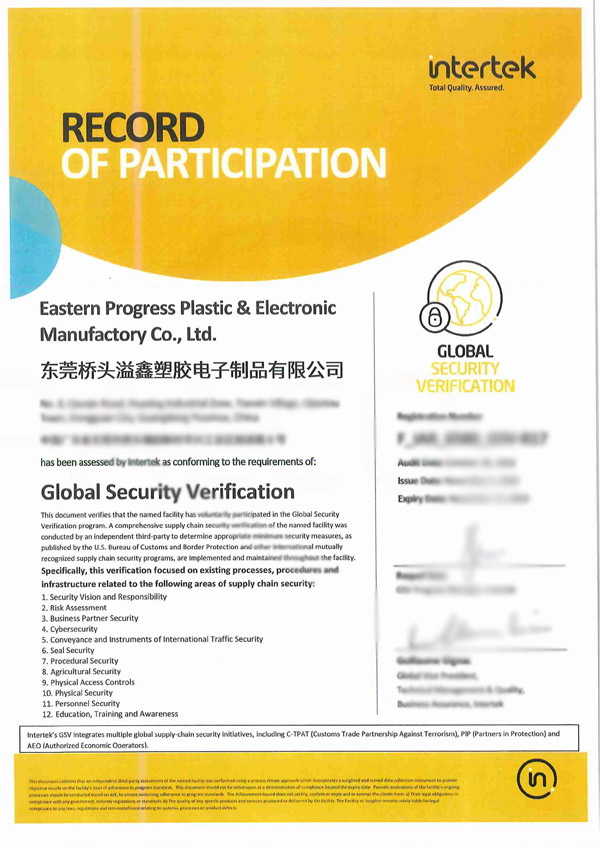
Global Security Verification (GSV) is a security assessment program that is used to evaluate the security practices of companies that handle sensitive or regulated materials. GSV assessments are often required by governments, regulatory agencies, or industry organizations as a way to ensure that companies are complying with security regulations and standards.
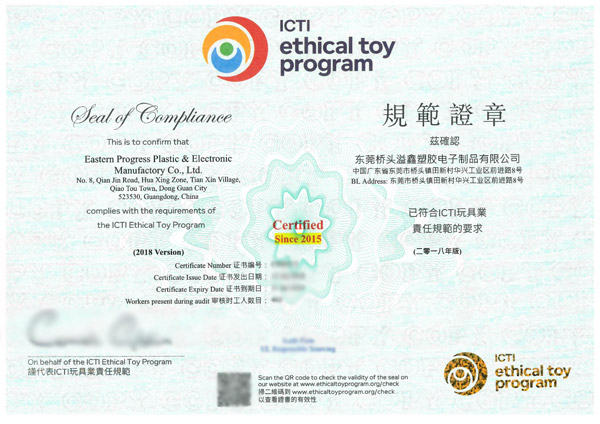
The International Council of Toy Industries (ICTI) Ethical Toy Program is a global certification program that aims to promote ethical and responsible practices in the toy industry. The program was developed by the ICTI, an international trade association that represents the toy industry, in response to concerns about child labor, unsafe working conditions, and other ethical issues in the toy industry.
The ICTI Ethical Toy Program sets standards for ethical and responsible practices in the toy industry and certifies toy factories that meet these standards. To be certified under the program, toy factories must meet a set of requirements that cover a range of issues, including labor standards, health and safety, and environmental practices. The program also includes a code of conduct that outlines the ethical standards that toy companies must follow.
The ICTI Ethical Toy Program is designed to provide assurance to consumers, governments, and other stakeholders that toys produced by participating factories are made in an ethical and responsible manner. The program is supported by a range of organizations, including toy companies, governments, and NGOs.
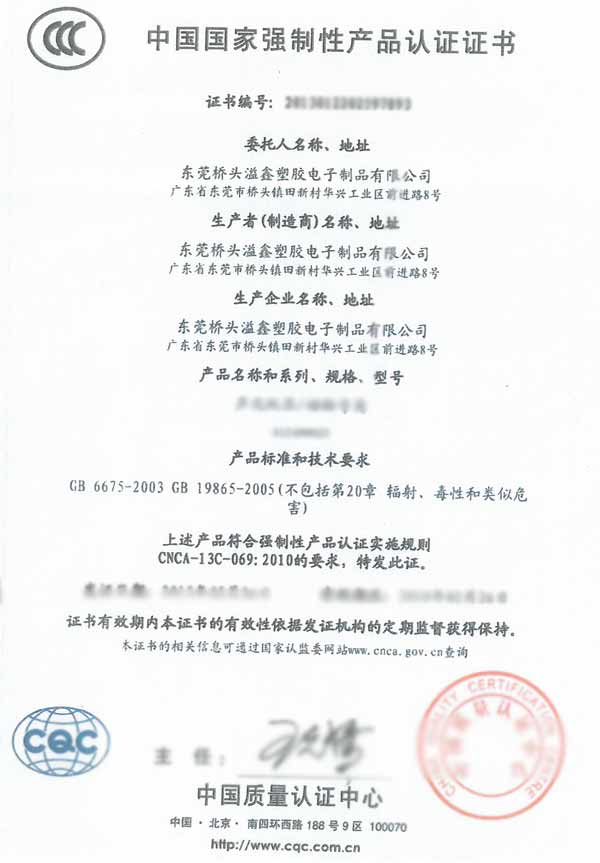
CCC certification refers to the China Compulsory Certification, which is a mandatory product certification scheme enforced by the Chinese government.
It applies to a wide range of products imported, sold or used in China and aims to ensure that they meet the country's safety, environmental, and quality standards. CCC certification is required for a variety of products, including electronics, toys, machinery, and automotive parts. Companies that want to export their products to China or operate in the Chinese market need to obtain CCC certification for their products.
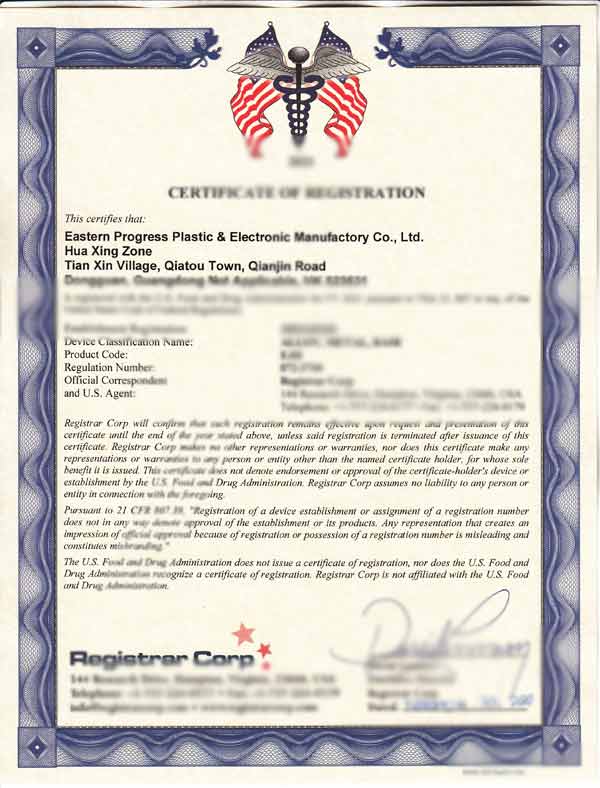
FDA certification refers to the certification process carried out by the United States Food and Drug Administration. The FDA is responsible for ensuring the safety and efficacy of various products, including food, drugs, medical devices, and cosmetics. FDA certification is required for companies that manufacture, distribute, or import these products into the United States market.
In the toy industry, FDA certification may be required for certain products that come into contact with children, such as teething rings or pacifiers. These products must meet specific safety standards to protect children from choking hazards or exposure to harmful substances. Companies that want to sell their toys in the United States market must obtain FDA certification for their products to ensure compliance with these safety standards.
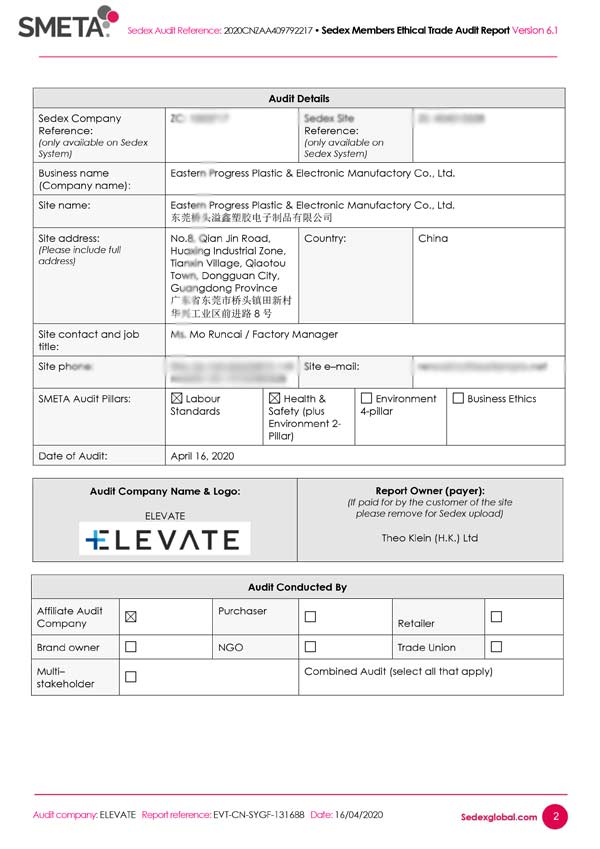
Sedex certification is a globally recognized certification program that focuses on ethical and sustainable business practices. The certification is awarded by the Supplier Ethical Data Exchange (Sedex), a non-profit organization that aims to promote ethical practices in the supply chain. The Sedex certification process involves an audit of a company's ethical and social practices, including labor standards, health and safety, environmental impact, and business ethics.
In the toy industry, Sedex certification can be an important indicator of a company's commitment to ethical and sustainable business practices. It demonstrates that the company has taken steps to ensure that its products are manufactured in an ethical and socially responsible manner, and that it is committed to protecting the environment. Sedex certification is becoming increasingly important for companies that want to sell their toys in the global market, as consumers are becoming more aware of the impact of their purchases on the environment and society as a whole.

Quality management system
ISO 9001:2015 is a standard for quality management systems (QMS). It was developed by the International Organization for Standardization (ISO), a non-governmental organization that develops and publishes international standards. an organization must develop and implement a QMS that meets the requirements of the standard and undergo an audit by a third-party certification body.
Certification to ISO 9001:2015 demonstrates to customers and other stakeholders that an organization has a well-managed, high-quality QMS in place.
In the context of toy manufacturing, an organization that follows ISO 9001:2015 would have a QMS in place that covers all aspects of the toy manufacturing process, including design, development, production, installation, and servicing. The QMS would include processes for identifying and addressing customer requirements, as well as for controlling and improving the quality of products and services

( BSCI ) The Business Social Compliance Initiative
BSCI (Business for Social Compliance Initiative) is a voluntary certification scheme that helps retail and trade businesses improve working conditions in their supply chains.
The scheme was developed in 2003 by the European business organization Foreign Trade Association (FTA). The BSCI Code of Conduct sets out guidelines for fair labor practices, health and safety, the environment and other areas.
BSCI-certified companies are required to implement the code of conduct in their supply chains and undergo regular audits to ensure compliance. The certification is recognized by major retailers and brands as a way to demonstrate commitment to ethical sourcing practices.
The advantages and role of BSCI certification?
1、Fulfilling the requirements of the guests.
2, a certification to cope with different guests - to reduce the number of times different buyers come at different times for factory inspection.
3、Improve the brand image and industry status of the factory.
4、The implementation of the standard can reduce the safety hazards of the factory.

SCAN Security Audit
Eastern Progress Plastic & Electronic Manufactory Co.,Ltd. passed the U.S.A SCAN certificate (Supplier Compliance Audit Network), the inspections include many safe parts, like people, equipment, and process, which is recognized by many well-known enterprises in the U.S.A.
With the SCAN certificate, we can make more American enterprises know about us.

Facility and Merchandise Authorization (FAMA) is a program administered by the United States Customs and Border Protection (CBP) that allows certain importers and exporters to apply for and receive authorization to use designated facilities for the storage, examination, and/or manipulation of imported and exported merchandise. The purpose of the FAMA program is to expedite the import and export process by allowing approved importers and exporters to use these designated facilities to streamline their customs clearance procedures.
To be eligible for the FAMA program, importers and exporters must meet certain requirements, such as having a history of compliance with customs regulations, maintaining an acceptable level of security at their facilities, and demonstrating the ability to handle and store merchandise in a secure and efficient manner. Once approved for the FAMA program, importers and exporters can use designated FAMA facilities to store, examine, and manipulate their imported and exported merchandise, which can help them to reduce costs and improve supply chain efficiency.

The Forest Stewardship Council (FSC) is an international non-profit organization that promotes responsible management of the world's forests. FSC works to ensure that forests are managed in an environmentally responsible, socially beneficial, and economically viable way. One way that FSC promotes responsible forestry is through its certification program.
FSC certification is a voluntary process that verifies that a company's forestry practices meet FSC's standards for responsible forestry. These standards cover a wide range of environmental, social, and economic aspects of forestry, including protecting forests and their biodiversity, respecting the rights of indigenous peoples, and ensuring that forestry operations are carried out in a sustainable manner.

Global Security Verification (GSV) is a security assessment program that is used to evaluate the security practices of companies that handle sensitive or regulated materials. GSV assessments are often required by governments, regulatory agencies, or industry organizations as a way to ensure that companies are complying with security regulations and standards.

The International Council of Toy Industries (ICTI) Ethical Toy Program is a global certification program that aims to promote ethical and responsible practices in the toy industry. The program was developed by the ICTI, an international trade association that represents the toy industry, in response to concerns about child labor, unsafe working conditions, and other ethical issues in the toy industry.
The ICTI Ethical Toy Program sets standards for ethical and responsible practices in the toy industry and certifies toy factories that meet these standards. To be certified under the program, toy factories must meet a set of requirements that cover a range of issues, including labor standards, health and safety, and environmental practices. The program also includes a code of conduct that outlines the ethical standards that toy companies must follow.
The ICTI Ethical Toy Program is designed to provide assurance to consumers, governments, and other stakeholders that toys produced by participating factories are made in an ethical and responsible manner. The program is supported by a range of organizations, including toy companies, governments, and NGOs.

CCC certification refers to the China Compulsory Certification, which is a mandatory product certification scheme enforced by the Chinese government.
It applies to a wide range of products imported, sold or used in China and aims to ensure that they meet the country's safety, environmental, and quality standards. CCC certification is required for a variety of products, including electronics, toys, machinery, and automotive parts. Companies that want to export their products to China or operate in the Chinese market need to obtain CCC certification for their products.

FDA certification refers to the certification process carried out by the United States Food and Drug Administration. The FDA is responsible for ensuring the safety and efficacy of various products, including food, drugs, medical devices, and cosmetics. FDA certification is required for companies that manufacture, distribute, or import these products into the United States market.
In the toy industry, FDA certification may be required for certain products that come into contact with children, such as teething rings or pacifiers. These products must meet specific safety standards to protect children from choking hazards or exposure to harmful substances. Companies that want to sell their toys in the United States market must obtain FDA certification for their products to ensure compliance with these safety standards.

Sedex certification is a globally recognized certification program that focuses on ethical and sustainable business practices. The certification is awarded by the Supplier Ethical Data Exchange (Sedex), a non-profit organization that aims to promote ethical practices in the supply chain. The Sedex certification process involves an audit of a company's ethical and social practices, including labor standards, health and safety, environmental impact, and business ethics.
In the toy industry, Sedex certification can be an important indicator of a company's commitment to ethical and sustainable business practices. It demonstrates that the company has taken steps to ensure that its products are manufactured in an ethical and socially responsible manner, and that it is committed to protecting the environment. Sedex certification is becoming increasingly important for companies that want to sell their toys in the global market, as consumers are becoming more aware of the impact of their purchases on the environment and society as a whole.

Quality management system
ISO 9001:2015 is a standard for quality management systems (QMS). It was developed by the International Organization for Standardization (ISO), a non-governmental organization that develops and publishes international standards. an organization must develop and implement a QMS that meets the requirements of the standard and undergo an audit by a third-party certification body.
Certification to ISO 9001:2015 demonstrates to customers and other stakeholders that an organization has a well-managed, high-quality QMS in place.
In the context of toy manufacturing, an organization that follows ISO 9001:2015 would have a QMS in place that covers all aspects of the toy manufacturing process, including design, development, production, installation, and servicing. The QMS would include processes for identifying and addressing customer requirements, as well as for controlling and improving the quality of products and services

( BSCI ) The Business Social Compliance Initiative
BSCI (Business for Social Compliance Initiative) is a voluntary certification scheme that helps retail and trade businesses improve working conditions in their supply chains.
The scheme was developed in 2003 by the European business organization Foreign Trade Association (FTA). The BSCI Code of Conduct sets out guidelines for fair labor practices, health and safety, the environment and other areas.
BSCI-certified companies are required to implement the code of conduct in their supply chains and undergo regular audits to ensure compliance. The certification is recognized by major retailers and brands as a way to demonstrate commitment to ethical sourcing practices.
The advantages and role of BSCI certification?
1、Fulfilling the requirements of the guests.
2, a certification to cope with different guests - to reduce the number of times different buyers come at different times for factory inspection.
3、Improve the brand image and industry status of the factory.
4、The implementation of the standard can reduce the safety hazards of the factory.

SCAN Security Audit
Eastern Progress Plastic & Electronic Manufactory Co.,Ltd. passed the U.S.A SCAN certificate (Supplier Compliance Audit Network), the inspections include many safe parts, like people, equipment, and process, which is recognized by many well-known enterprises in the U.S.A.
With the SCAN certificate, we can make more American enterprises know about us.

Facility and Merchandise Authorization (FAMA) is a program administered by the United States Customs and Border Protection (CBP) that allows certain importers and exporters to apply for and receive authorization to use designated facilities for the storage, examination, and/or manipulation of imported and exported merchandise. The purpose of the FAMA program is to expedite the import and export process by allowing approved importers and exporters to use these designated facilities to streamline their customs clearance procedures.
To be eligible for the FAMA program, importers and exporters must meet certain requirements, such as having a history of compliance with customs regulations, maintaining an acceptable level of security at their facilities, and demonstrating the ability to handle and store merchandise in a secure and efficient manner. Once approved for the FAMA program, importers and exporters can use designated FAMA facilities to store, examine, and manipulate their imported and exported merchandise, which can help them to reduce costs and improve supply chain efficiency.

The Forest Stewardship Council (FSC) is an international non-profit organization that promotes responsible management of the world's forests. FSC works to ensure that forests are managed in an environmentally responsible, socially beneficial, and economically viable way. One way that FSC promotes responsible forestry is through its certification program.
FSC certification is a voluntary process that verifies that a company's forestry practices meet FSC's standards for responsible forestry. These standards cover a wide range of environmental, social, and economic aspects of forestry, including protecting forests and their biodiversity, respecting the rights of indigenous peoples, and ensuring that forestry operations are carried out in a sustainable manner.

Global Security Verification (GSV) is a security assessment program that is used to evaluate the security practices of companies that handle sensitive or regulated materials. GSV assessments are often required by governments, regulatory agencies, or industry organizations as a way to ensure that companies are complying with security regulations and standards.

The International Council of Toy Industries (ICTI) Ethical Toy Program is a global certification program that aims to promote ethical and responsible practices in the toy industry. The program was developed by the ICTI, an international trade association that represents the toy industry, in response to concerns about child labor, unsafe working conditions, and other ethical issues in the toy industry.
The ICTI Ethical Toy Program sets standards for ethical and responsible practices in the toy industry and certifies toy factories that meet these standards. To be certified under the program, toy factories must meet a set of requirements that cover a range of issues, including labor standards, health and safety, and environmental practices. The program also includes a code of conduct that outlines the ethical standards that toy companies must follow.
The ICTI Ethical Toy Program is designed to provide assurance to consumers, governments, and other stakeholders that toys produced by participating factories are made in an ethical and responsible manner. The program is supported by a range of organizations, including toy companies, governments, and NGOs.

CCC certification refers to the China Compulsory Certification, which is a mandatory product certification scheme enforced by the Chinese government.
It applies to a wide range of products imported, sold or used in China and aims to ensure that they meet the country's safety, environmental, and quality standards. CCC certification is required for a variety of products, including electronics, toys, machinery, and automotive parts. Companies that want to export their products to China or operate in the Chinese market need to obtain CCC certification for their products.

FDA certification refers to the certification process carried out by the United States Food and Drug Administration. The FDA is responsible for ensuring the safety and efficacy of various products, including food, drugs, medical devices, and cosmetics. FDA certification is required for companies that manufacture, distribute, or import these products into the United States market.
In the toy industry, FDA certification may be required for certain products that come into contact with children, such as teething rings or pacifiers. These products must meet specific safety standards to protect children from choking hazards or exposure to harmful substances. Companies that want to sell their toys in the United States market must obtain FDA certification for their products to ensure compliance with these safety standards.

Sedex certification is a globally recognized certification program that focuses on ethical and sustainable business practices. The certification is awarded by the Supplier Ethical Data Exchange (Sedex), a non-profit organization that aims to promote ethical practices in the supply chain. The Sedex certification process involves an audit of a company's ethical and social practices, including labor standards, health and safety, environmental impact, and business ethics.
In the toy industry, Sedex certification can be an important indicator of a company's commitment to ethical and sustainable business practices. It demonstrates that the company has taken steps to ensure that its products are manufactured in an ethical and socially responsible manner, and that it is committed to protecting the environment. Sedex certification is becoming increasingly important for companies that want to sell their toys in the global market, as consumers are becoming more aware of the impact of their purchases on the environment and society as a whole.

Quality management system
ISO 9001:2015 is a standard for quality management systems (QMS). It was developed by the International Organization for Standardization (ISO), a non-governmental organization that develops and publishes international standards. an organization must develop and implement a QMS that meets the requirements of the standard and undergo an audit by a third-party certification body.
Certification to ISO 9001:2015 demonstrates to customers and other stakeholders that an organization has a well-managed, high-quality QMS in place.
In the context of toy manufacturing, an organization that follows ISO 9001:2015 would have a QMS in place that covers all aspects of the toy manufacturing process, including design, development, production, installation, and servicing. The QMS would include processes for identifying and addressing customer requirements, as well as for controlling and improving the quality of products and services

( BSCI ) The Business Social Compliance Initiative
BSCI (Business for Social Compliance Initiative) is a voluntary certification scheme that helps retail and trade businesses improve working conditions in their supply chains.
The scheme was developed in 2003 by the European business organization Foreign Trade Association (FTA). The BSCI Code of Conduct sets out guidelines for fair labor practices, health and safety, the environment and other areas.
BSCI-certified companies are required to implement the code of conduct in their supply chains and undergo regular audits to ensure compliance. The certification is recognized by major retailers and brands as a way to demonstrate commitment to ethical sourcing practices.
The advantages and role of BSCI certification?
1、Fulfilling the requirements of the guests.
2, a certification to cope with different guests - to reduce the number of times different buyers come at different times for factory inspection.
3、Improve the brand image and industry status of the factory.
4、The implementation of the standard can reduce the safety hazards of the factory.

SCAN Security Audit
Eastern Progress Plastic & Electronic Manufactory Co.,Ltd. passed the U.S.A SCAN certificate (Supplier Compliance Audit Network), the inspections include many safe parts, like people, equipment, and process, which is recognized by many well-known enterprises in the U.S.A.
With the SCAN certificate, we can make more American enterprises know about us.

Facility and Merchandise Authorization (FAMA) is a program administered by the United States Customs and Border Protection (CBP) that allows certain importers and exporters to apply for and receive authorization to use designated facilities for the storage, examination, and/or manipulation of imported and exported merchandise. The purpose of the FAMA program is to expedite the import and export process by allowing approved importers and exporters to use these designated facilities to streamline their customs clearance procedures.
To be eligible for the FAMA program, importers and exporters must meet certain requirements, such as having a history of compliance with customs regulations, maintaining an acceptable level of security at their facilities, and demonstrating the ability to handle and store merchandise in a secure and efficient manner. Once approved for the FAMA program, importers and exporters can use designated FAMA facilities to store, examine, and manipulate their imported and exported merchandise, which can help them to reduce costs and improve supply chain efficiency.

The Forest Stewardship Council (FSC) is an international non-profit organization that promotes responsible management of the world's forests. FSC works to ensure that forests are managed in an environmentally responsible, socially beneficial, and economically viable way. One way that FSC promotes responsible forestry is through its certification program.
FSC certification is a voluntary process that verifies that a company's forestry practices meet FSC's standards for responsible forestry. These standards cover a wide range of environmental, social, and economic aspects of forestry, including protecting forests and their biodiversity, respecting the rights of indigenous peoples, and ensuring that forestry operations are carried out in a sustainable manner.

Global Security Verification (GSV) is a security assessment program that is used to evaluate the security practices of companies that handle sensitive or regulated materials. GSV assessments are often required by governments, regulatory agencies, or industry organizations as a way to ensure that companies are complying with security regulations and standards.

The International Council of Toy Industries (ICTI) Ethical Toy Program is a global certification program that aims to promote ethical and responsible practices in the toy industry. The program was developed by the ICTI, an international trade association that represents the toy industry, in response to concerns about child labor, unsafe working conditions, and other ethical issues in the toy industry.
The ICTI Ethical Toy Program sets standards for ethical and responsible practices in the toy industry and certifies toy factories that meet these standards. To be certified under the program, toy factories must meet a set of requirements that cover a range of issues, including labor standards, health and safety, and environmental practices. The program also includes a code of conduct that outlines the ethical standards that toy companies must follow.
The ICTI Ethical Toy Program is designed to provide assurance to consumers, governments, and other stakeholders that toys produced by participating factories are made in an ethical and responsible manner. The program is supported by a range of organizations, including toy companies, governments, and NGOs.

CCC certification refers to the China Compulsory Certification, which is a mandatory product certification scheme enforced by the Chinese government.
It applies to a wide range of products imported, sold or used in China and aims to ensure that they meet the country's safety, environmental, and quality standards. CCC certification is required for a variety of products, including electronics, toys, machinery, and automotive parts. Companies that want to export their products to China or operate in the Chinese market need to obtain CCC certification for their products.

FDA certification refers to the certification process carried out by the United States Food and Drug Administration. The FDA is responsible for ensuring the safety and efficacy of various products, including food, drugs, medical devices, and cosmetics. FDA certification is required for companies that manufacture, distribute, or import these products into the United States market.
In the toy industry, FDA certification may be required for certain products that come into contact with children, such as teething rings or pacifiers. These products must meet specific safety standards to protect children from choking hazards or exposure to harmful substances. Companies that want to sell their toys in the United States market must obtain FDA certification for their products to ensure compliance with these safety standards.

Sedex certification is a globally recognized certification program that focuses on ethical and sustainable business practices. The certification is awarded by the Supplier Ethical Data Exchange (Sedex), a non-profit organization that aims to promote ethical practices in the supply chain. The Sedex certification process involves an audit of a company's ethical and social practices, including labor standards, health and safety, environmental impact, and business ethics.
In the toy industry, Sedex certification can be an important indicator of a company's commitment to ethical and sustainable business practices. It demonstrates that the company has taken steps to ensure that its products are manufactured in an ethical and socially responsible manner, and that it is committed to protecting the environment. Sedex certification is becoming increasingly important for companies that want to sell their toys in the global market, as consumers are becoming more aware of the impact of their purchases on the environment and society as a whole.

Quality management system
ISO 9001:2015 is a standard for quality management systems (QMS). It was developed by the International Organization for Standardization (ISO), a non-governmental organization that develops and publishes international standards. an organization must develop and implement a QMS that meets the requirements of the standard and undergo an audit by a third-party certification body.
Certification to ISO 9001:2015 demonstrates to customers and other stakeholders that an organization has a well-managed, high-quality QMS in place.
In the context of toy manufacturing, an organization that follows ISO 9001:2015 would have a QMS in place that covers all aspects of the toy manufacturing process, including design, development, production, installation, and servicing. The QMS would include processes for identifying and addressing customer requirements, as well as for controlling and improving the quality of products and services

( BSCI ) The Business Social Compliance Initiative
BSCI (Business for Social Compliance Initiative) is a voluntary certification scheme that helps retail and trade businesses improve working conditions in their supply chains.
The scheme was developed in 2003 by the European business organization Foreign Trade Association (FTA). The BSCI Code of Conduct sets out guidelines for fair labor practices, health and safety, the environment and other areas.
BSCI-certified companies are required to implement the code of conduct in their supply chains and undergo regular audits to ensure compliance. The certification is recognized by major retailers and brands as a way to demonstrate commitment to ethical sourcing practices.
The advantages and role of BSCI certification?
1、Fulfilling the requirements of the guests.
2, a certification to cope with different guests - to reduce the number of times different buyers come at different times for factory inspection.
3、Improve the brand image and industry status of the factory.
4、The implementation of the standard can reduce the safety hazards of the factory.

SCAN Security Audit
Eastern Progress Plastic & Electronic Manufactory Co.,Ltd. passed the U.S.A SCAN certificate (Supplier Compliance Audit Network), the inspections include many safe parts, like people, equipment, and process, which is recognized by many well-known enterprises in the U.S.A.
With the SCAN certificate, we can make more American enterprises know about us.

Facility and Merchandise Authorization (FAMA) is a program administered by the United States Customs and Border Protection (CBP) that allows certain importers and exporters to apply for and receive authorization to use designated facilities for the storage, examination, and/or manipulation of imported and exported merchandise. The purpose of the FAMA program is to expedite the import and export process by allowing approved importers and exporters to use these designated facilities to streamline their customs clearance procedures.
To be eligible for the FAMA program, importers and exporters must meet certain requirements, such as having a history of compliance with customs regulations, maintaining an acceptable level of security at their facilities, and demonstrating the ability to handle and store merchandise in a secure and efficient manner. Once approved for the FAMA program, importers and exporters can use designated FAMA facilities to store, examine, and manipulate their imported and exported merchandise, which can help them to reduce costs and improve supply chain efficiency.

The Forest Stewardship Council (FSC) is an international non-profit organization that promotes responsible management of the world's forests. FSC works to ensure that forests are managed in an environmentally responsible, socially beneficial, and economically viable way. One way that FSC promotes responsible forestry is through its certification program.
FSC certification is a voluntary process that verifies that a company's forestry practices meet FSC's standards for responsible forestry. These standards cover a wide range of environmental, social, and economic aspects of forestry, including protecting forests and their biodiversity, respecting the rights of indigenous peoples, and ensuring that forestry operations are carried out in a sustainable manner.

Global Security Verification (GSV) is a security assessment program that is used to evaluate the security practices of companies that handle sensitive or regulated materials. GSV assessments are often required by governments, regulatory agencies, or industry organizations as a way to ensure that companies are complying with security regulations and standards.

The International Council of Toy Industries (ICTI) Ethical Toy Program is a global certification program that aims to promote ethical and responsible practices in the toy industry. The program was developed by the ICTI, an international trade association that represents the toy industry, in response to concerns about child labor, unsafe working conditions, and other ethical issues in the toy industry.
The ICTI Ethical Toy Program sets standards for ethical and responsible practices in the toy industry and certifies toy factories that meet these standards. To be certified under the program, toy factories must meet a set of requirements that cover a range of issues, including labor standards, health and safety, and environmental practices. The program also includes a code of conduct that outlines the ethical standards that toy companies must follow.
The ICTI Ethical Toy Program is designed to provide assurance to consumers, governments, and other stakeholders that toys produced by participating factories are made in an ethical and responsible manner. The program is supported by a range of organizations, including toy companies, governments, and NGOs.

CCC certification refers to the China Compulsory Certification, which is a mandatory product certification scheme enforced by the Chinese government.
It applies to a wide range of products imported, sold or used in China and aims to ensure that they meet the country's safety, environmental, and quality standards. CCC certification is required for a variety of products, including electronics, toys, machinery, and automotive parts. Companies that want to export their products to China or operate in the Chinese market need to obtain CCC certification for their products.

FDA certification refers to the certification process carried out by the United States Food and Drug Administration. The FDA is responsible for ensuring the safety and efficacy of various products, including food, drugs, medical devices, and cosmetics. FDA certification is required for companies that manufacture, distribute, or import these products into the United States market.
In the toy industry, FDA certification may be required for certain products that come into contact with children, such as teething rings or pacifiers. These products must meet specific safety standards to protect children from choking hazards or exposure to harmful substances. Companies that want to sell their toys in the United States market must obtain FDA certification for their products to ensure compliance with these safety standards.

Sedex certification is a globally recognized certification program that focuses on ethical and sustainable business practices. The certification is awarded by the Supplier Ethical Data Exchange (Sedex), a non-profit organization that aims to promote ethical practices in the supply chain. The Sedex certification process involves an audit of a company's ethical and social practices, including labor standards, health and safety, environmental impact, and business ethics.
In the toy industry, Sedex certification can be an important indicator of a company's commitment to ethical and sustainable business practices. It demonstrates that the company has taken steps to ensure that its products are manufactured in an ethical and socially responsible manner, and that it is committed to protecting the environment. Sedex certification is becoming increasingly important for companies that want to sell their toys in the global market, as consumers are becoming more aware of the impact of their purchases on the environment and society as a whole.